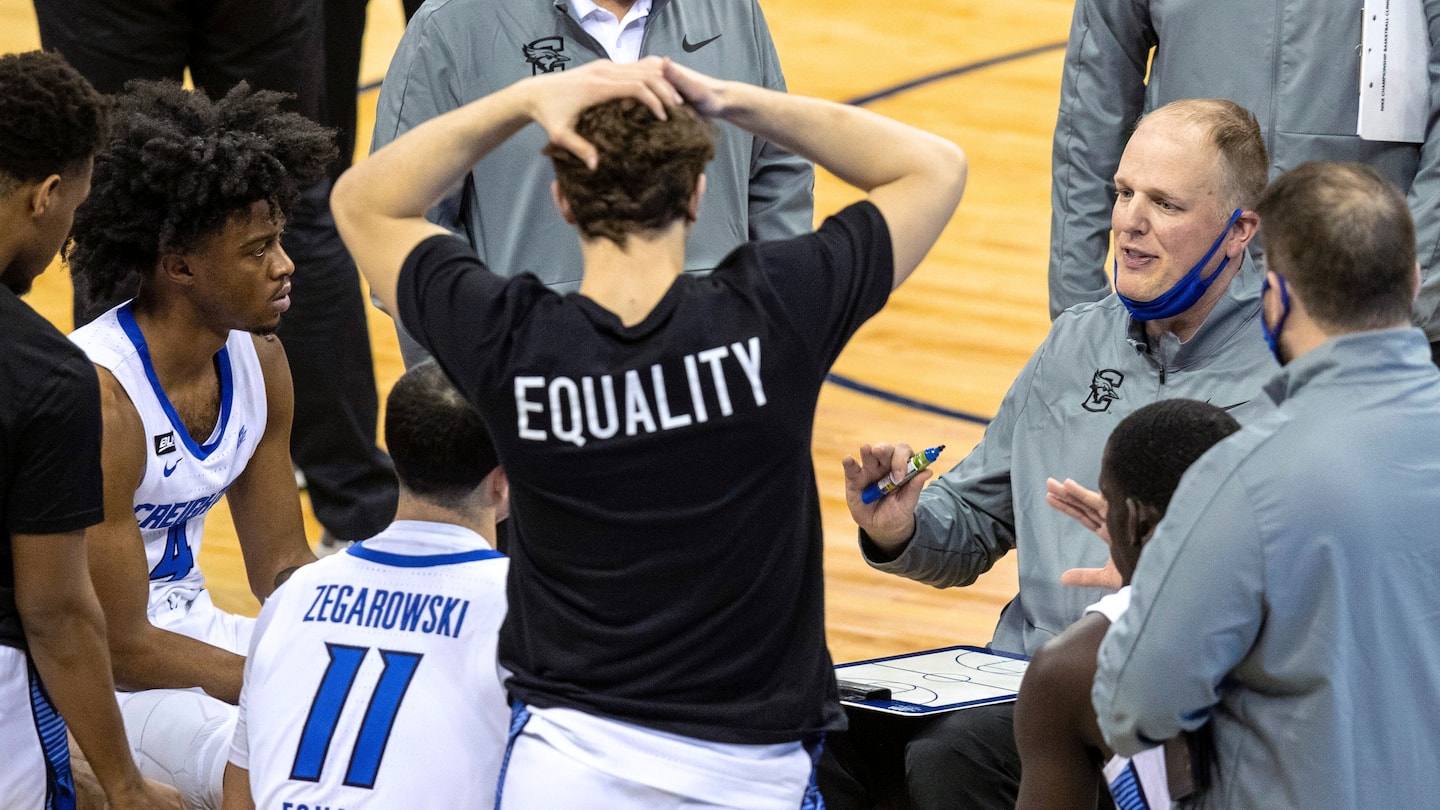The difference between a plantation and college sports: A plantation didn’t pretend

McDermott didn’t simply misspeak in a fit of frustration. Judging by the actions of his more tight-lipped peers, he provided a shameful sound bite that elucidates the cavalier disregard for players that many coaches and so-called college leaders exhibit. McDermott unmasked the profession. It will be harder to treat players like property, for now.
Don’t let the anticipation of Selection Sunday conceal this problem. The late-season controversy shouldn’t be labeled as just a Creighton issue. It served as an unsettling bookend to a college sports year that began last summer with the flap over Oklahoma State football coach Mike Gundy wearing a One America News T-shirt.
Star running back Chuba Hubbard called out his coach on social media for wearing the gear of a network that had referred to the Black Lives Matter movement as a “farce” and a “criminal front group.” Gundy apologized and took a $1 million pay cut. He and Hubbard appeared on a strange solidarity video to smooth things over, and the Cowboys went on to have a solid 8-3 season. But what stays with me nine months later is that Hubbard, 21, came across as more mature, considerate and worthy of being followed than his 53-year-old coach.
Gundy makes $4.25 million per year and ranks as Oklahoma’s second-highest-paid state employee (behind Oklahoma football coach Lincoln Riley), presumably because he is such a great leader of young men who feed our football obsession. He is so rich he took a seven-figure shave to slither out of trouble. But he still can’t afford Hubbard’s moral compass.
As this pandemic-addled year in college sports transitions to the spring season, a story line continues to germinate: With several high-profile examples of poor leadership, coaches are unwittingly inviting players to scrutinize them. The athletes should be asking some tough questions. Should I play for this coach? Why is he worthy of absolute power? What can I do to change the dynamic?
There is a place for athlete power in college sports, and the push for it transcends the fight for compensation beyond scholarships. Influence is also an aspiration, and to acquire more of it, the players need to apply more pressure. Recruits need to be more thorough and demanding during the wooing process. Once on campus, star players need to follow Hubbard’s example and speak up when their coaches act in a disrespectful manner. All players need to understand the game within the game better, shed their naivete sooner and garner confidence through realizing that their talent enlivens these sports.
For the elite prospects considering college basketball, their options are starting to multiply. The NBA debuted its G League Ignite team, which pays select high school players six-figure salaries to skip college and enter a developmental program. Last week, the Overtime media company announced plans to pay up to 30 16-to-18-year-olds at least $100,000 to participate in a new league. The venture includes Carmelo Anthony and Kevin Durant as investors and serves as competition for the Professional Collegiate League, another budding alternative for blue-chippers.
When asked about the formation of another alternative to college, NBA Commissioner Adam Silver said: “I think it’s generally good for the community to have optionality.”
For college basketball, it’s generally another headache. If successful, the G League, PCL and Overtime would take a huge chunk of the very best high school talent. And then there’s the growing sense that a one-time transfer waiver for all sports has momentum, which would create a wild roster-management situation for every team. To have stability and retention, coaches would be re-recruiting their players constantly. It has a chance of altering relationships dramatically, but good leaders and communicators will adjust. They will do what they are supposed to do: guide the athletes responsibly. The players are the essential ingredient, yet for some reason, coaches have become the stars, not the stewards. It’s a formula for massive egos. And shame, too.
One inappropriate plantation quote won’t spur a paradigm shift. But it’s another piece of mounting evidence highlighting college coaches and athletic administrators who abuse their authority. They run amok in all kinds of ways, and while McDermott’s regrettable language isn’t as troubling as the sexual misconduct allegations that will end Kansas football coach Les Miles’s career, one common theme exists: The potential for disaster lurks behind every unchecked authority figure. This is a truism of life, but we can’t resist manufacturing false gods.
Some coaches are only as good as they have to be. You’d like to think McDermott, who has shown remorse and been more forthright than most of his peers would be, truly did make what he called “an awful mistake.” You’d like to think he saw his players as people after the incident. You’d like to believe it came from the heart when he said, “The pain I caused our players, who look to me as a mentor and as a leader — the pain that I saw in their eyes — was immense.”
But it’s hard not to see the Creighton situation — and how the university delayed his slap-on-the-wrist suspension until after the big Villanova game — as much more than a strategic, public relations maneuver. The McDermott case is a symptom of a complex college disease, one that values the program over the kids who sweat to maintain it, one that keeps profiting off deceitful, paternalistic attitudes about raising young athletic phenoms.
McDermott’s blunder was emblematic of the bloated entitlement bestowed on every authority figure in college sports, and Sunday’s tournament bracket reveal should highlight that, not obscure it.
No, the forthcoming bracket reveal doesn’t provide a cure. No, we can’t let slide the bloated entitlement that the McDermott blunder represents. We also can’t ignore the truth embedded in his words.
The NCAA men’s basketball tournament is the billion-dollar jewel of college athletics. It compels everybody to stay on the plantation.






